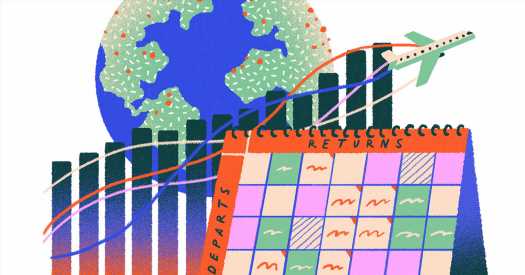Even as inflation shows signs of slowing, airfares remain high, up nearly 10 percent in April compared with the same period in 2019, according to the Bureau of Labor Statistics. Coming out of the pandemic, fewer flights, a shortage of airline workers and higher fuel costs, have helped push prices up. And consumers, eager to travel, haven’t revolted sufficiently to persuade carriers to bring them down.
But the picture can be confusing — and changeable.
According to the travel booking app Hopper, current prices on domestic airfares are well below last year right now, but are expected to rise through June when summer airfares typically peak. Hopper predicts the peak for a domestic round-trip booking will reach $328, better than the $400 last June but still 4 percent higher than the same period in 2019.
International fares, where available flights lag demand, are a bleaker story: Hopper expects tickets abroad this summer to be at a five-year high, up 32 percent to Europe compared with last summer (or $1,188 on average). Flights to Asia are up 17 percent (averaging $1,890) compared to last summer; that’s 67 percent more than in 2019.
What’s a traveler to do to keep from being fleeced? Keep an open mind.
“It’s about being flexible on one of the parameters of booking,” said Laura Lindsay, a global travel trends expert at Skyscanner, an airfare search site. “If you are flexible on when or where you want to go and even how you want to go, perhaps flying out of one airport and returning to a different one or on a different carrier, there’s a deal. If you’re rigid, you’ll be fenced into a more expensive fare.”
When you fly can be easiest to adjust. Skyscanner lets users look at prices for a route within a month’s time, letting them find the lowest fares. Google Flights sends price alerts for good fares on any dates on a specified route, and Kayak allows searches using flexible dates.
When it comes to where to go, consider 2023 a summer of spontaneity.
“Let the deal dictate the destination if you can,” said Ted Rossman, a senior industry analyst at Bankrate, a personal finance website. “So often people get their hearts set on a place and that limits their options. If you don’t care which beach, shop around.”
If you haven’t booked summer flights, do it now. Hopper generally recommends monitoring domestic fares three to four months in advance of travel — many search engines will track specified routes — and buying one to two months out. In summer, it says the best deals are often available three to four months in advance.
Another potential money saver, a practice called skiplagging, allows fliers to book a ticket with an intermediate stop in their intended destination and then skip the final leg of their trip, which can sometimes be cheaper than flying direct. The website Skiplagged assembles available deals based on your preferred airport. For example, it recently flagged a flight from San Francisco to Jacksonville, Fla., with a stop in Miami for $134. A direct flight between San Francisco and Miami was $158. The method, which the airlines hate, requires fliers to book outbound and return tickets separately and forgo checked bags.
Alternatively, look for airfare and hotel packages assembled for less than the sum of their parts. The online travel agency Priceline said its packages save an average of $240 per booking. JetBlue Vacations, a branch of the airline, said its hotel and airfare deals are better than booking separately 90 percent of the time. Shoppers can use the “Best Vacation Finder” tool to compare offers in a variety of beach destinations, mountain getaways and cities.
Finally, don’t overlook points accrued by flying or spending on credit cards as payment.
“It’s all the more important now,” Mr. Rossman said, noting that many consumers amassed stockpiles of points during the pandemic, caches at risk of devaluation by airlines, which can change the requirements at will, charging 60,000 points for a flight that was 50,000 yesterday. “Providers are recovering from the pandemic, and they want paid customers, not freebies.”
Source: Read Full Article
